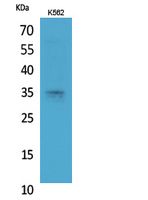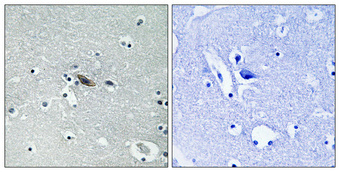Syntaxin 1 Polyclonal Antibody
- Catalog No.:YT5440
- Applications:WB;IHC;IF;ELISA
- Reactivity:Human;Mouse;Rat
- Target:
- Syntaxin 1
- Fields:
- >>SNARE interactions in vesicular transport;>>Synaptic vesicle cycle;>>Insulin secretion;>>Huntington disease;>>Pathways of neurodegeneration - multiple diseases;>>Amphetamine addiction
- Gene Name:
- STX1A
- Protein Name:
- Syntaxin-1A
- Human Gene Id:
- 6804
- Human Swiss Prot No:
- Q16623
- Mouse Gene Id:
- 20907
- Mouse Swiss Prot No:
- O35526
- Rat Gene Id:
- 116470
- Rat Swiss Prot No:
- P32851
- Immunogen:
- The antiserum was produced against synthesized peptide derived from the Internal region of human STX1A. AA range:31-80
- Specificity:
- Syntaxin 1 Polyclonal Antibody detects endogenous levels of Syntaxin 1 protein.
- Formulation:
- Liquid in PBS containing 50% glycerol, 0.5% BSA and 0.02% sodium azide.
- Source:
- Polyclonal, Rabbit,IgG
- Dilution:
- WB 1:500 - 1:2000. IHC: 1:100-1:300. ELISA: 1:20000.. IF 1:50-200
- Purification:
- The antibody was affinity-purified from rabbit antiserum by affinity-chromatography using epitope-specific immunogen.
- Concentration:
- 1 mg/ml
- Storage Stability:
- -15°C to -25°C/1 year(Do not lower than -25°C)
- Other Name:
- STX1A;STX1;Syntaxin-1A;Neuron-specific antigen HPC-1
- Observed Band(KD):
- 30kD
- Background:
- This gene encodes a member of the syntaxin superfamily. Syntaxins are nervous system-specific proteins implicated in the docking of synaptic vesicles with the presynaptic plasma membrane. Syntaxins possess a single C-terminal transmembrane domain, a SNARE [Soluble NSF (N-ethylmaleimide-sensitive fusion protein)-Attachment protein REceptor] domain (known as H3), and an N-terminal regulatory domain (Habc). Syntaxins bind synaptotagmin in a calcium-dependent fashion and interact with voltage dependent calcium and potassium channels via the C-terminal H3 domain. This gene product is a key molecule in ion channel regulation and synaptic exocytosis. Alternatively spliced transcript variants encoding different isoforms have been found for this gene.[provided by RefSeq, Sep 2009],
- Function:
- disease:Haploinsufficiency of STX1A may be the cause of certain cardiovascular and musculo-skeletal abnormalities observed in Williams-Beuren syndrome (WBS), a rare developmental disorder. It is a contiguous gene deletion syndrome involving genes from chromosome band 7q11.23.,function:Potentially involved in docking of synaptic vesicles at presynaptic active zones. May play a critical role in neurotransmitter exocytosis.,similarity:Belongs to the syntaxin family.,similarity:Contains 1 t-SNARE coiled-coil homology domain.,subunit:Part of the SNARE core complex containing SNAP25, VAMP2 and STX1A. This complex binds to CPLX1. Binds SYTL4 and STXBP6. Found in a ternary complex with STX1A and SNAP25. Interacts with OTOF (By similarity). Found in a complex with VAMP8 and SNAP23. Interacts with VAPA and SYBU.,tissue specificity:Isoform 1 is highly expressed in embryonic spinal chord and ganglia
- Subcellular Location:
- Cytoplasmic vesicle, secretory vesicle, synaptic vesicle membrane ; Single-pass type IV membrane protein . Cell junction, synapse, synaptosome . Cell membrane . Colocalizes with KCNB1 at the cell membrane. .; [Isoform 2]: Secreted .
- Expression:
- [Isoform 1]: Highly expressed in embryonic spinal cord and ganglia and in adult cerebellum and cerebral cortex. ; [Isoform 2]: Expressed in heart, liver, fat, skeletal muscle, kidney and brain.
- June 19-2018
- WESTERN IMMUNOBLOTTING PROTOCOL
- June 19-2018
- IMMUNOHISTOCHEMISTRY-PARAFFIN PROTOCOL
- June 19-2018
- IMMUNOFLUORESCENCE PROTOCOL
- September 08-2020
- FLOW-CYTOMEYRT-PROTOCOL
- May 20-2022
- Cell-Based ELISA│解您多样本WB检测之困扰
- July 13-2018
- CELL-BASED-ELISA-PROTOCOL-FOR-ACETYL-PROTEIN
- July 13-2018
- CELL-BASED-ELISA-PROTOCOL-FOR-PHOSPHO-PROTEIN
- July 13-2018
- Antibody-FAQs
- Products Images

- Western Blot analysis of K562 cells using Syntaxin 1 Polyclonal Antibody. Secondary antibody(catalog#:RS0002) was diluted at 1:20000
.jpg)
- Immunohistochemical analysis of paraffin-embedded human-liver, antibody was diluted at 1:100


